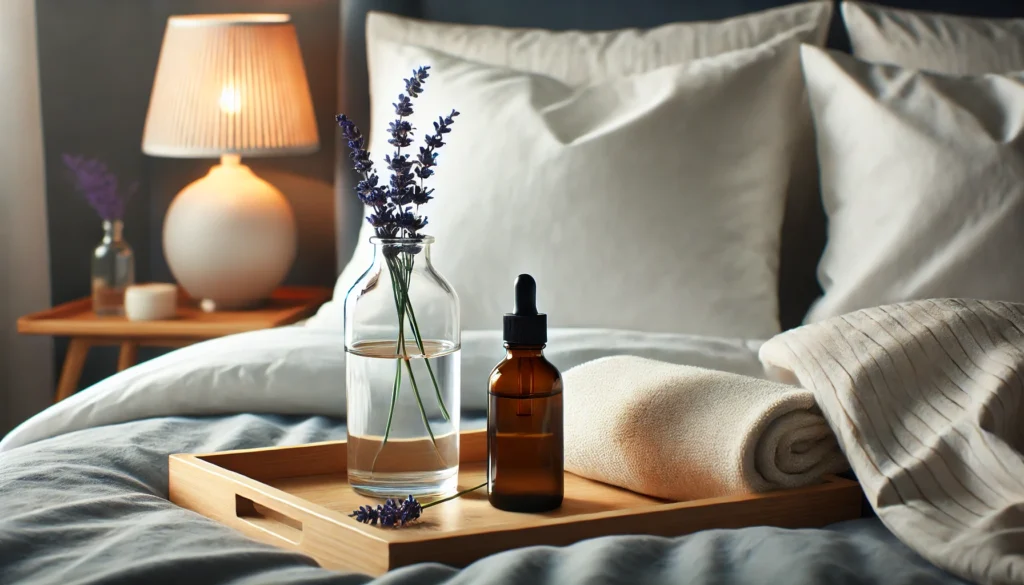In today’s fast-paced world, achieving a good night’s sleep has become increasingly elusive for many. Sleep deprivation is not only a personal health issue but also a societal concern, impacting productivity and overall well-being. The quest for quality rest has led to the rising popularity of strong sleeping liquids as a potential solution. But what exactly are these potent elixirs, and how do they promise to enhance our nightly rest?
This article delves into the world of strong sleeping liquids, examining their benefits, risks, and the science behind their efficacy. Whether you’re a health and wellness coach, science journalist, or biohacker, understanding these liquid remedies could be the key to unlocking better sleep for yourself or your clients.
You May Also Like: Essential Vitamins for Better Sleep Quality
Understanding Strong Sleeping Liquids
Strong sleeping liquids are formulations designed to promote relaxation and induce sleep. They often contain a mix of natural and synthetic ingredients, each chosen for its ability to calm the mind and body. These potent concoctions are typically available as over-the-counter (OTC) supplements or, in some cases, prescribed by healthcare providers.
Types of Strong Sleeping Liquids
Strong sleeping liquids come in various formulations, each tailored to different needs. Some are purely natural, relying on herbal extracts and amino acids, while others may combine these with synthetic components for enhanced effectiveness. The choice between these types often depends on personal preferences and specific sleep challenges.
Mechanisms of Action
The effectiveness of strong sleeping liquids is rooted in their diverse mechanisms of action. These liquids target different pathways in the brain and body, such as boosting melatonin levels to regulate sleep cycles or increasing GABA activity to promote relaxation. Understanding these mechanisms can help users select the right product for their needs.
Availability and Regulation
While many strong sleeping liquids are available over-the-counter, their availability can vary by region due to regulatory differences. Some countries may require prescriptions for certain formulations, especially those with higher concentrations of active ingredients. It’s crucial to be aware of these regulations to ensure safe and legal use.

Key Ingredients
The effectiveness of any sleeping liquid largely depends on its ingredients. Some common components include:
Melatonin
Melatonin is a hormone that regulates the sleep-wake cycle, helping to signal the body that it’s time for rest. It is particularly useful for people with sleep disorders stemming from disrupted circadian rhythms, like shift workers or those with jet lag. Melatonin supplementation can be a gentle and natural way to encourage sleep onset.
Valerian Root
Valerian root is an herbal remedy known for its sedative properties, often used to reduce anxiety and promote sleep. Its use dates back to ancient times, and it remains popular due to its calming effects. Users often report improved sleep quality and decreased time to fall asleep when using valerian root.
L-Theanine
L-Theanine is an amino acid found in tea leaves, known for its relaxing effects without causing drowsiness. It works by increasing levels of neurotransmitters like serotonin and dopamine, which contribute to relaxation and a sense of well-being. This makes L-Theanine an excellent choice for those seeking calm without sedation.
Diphenhydramine
Diphenhydramine is an antihistamine that induces drowsiness, often found in OTC sleep aids. It acts by blocking histamine receptors in the brain, which can lead to sedation. While effective, it is essential to use diphenhydramine with caution due to potential side effects like morning grogginess.
Gamma-Aminobutyric Acid (GABA)
Gamma-Aminobutyric Acid (GABA) is a neurotransmitter that inhibits brain activity, aiding in relaxation and sleep. It plays a crucial role in reducing neuronal excitability throughout the nervous system. GABA supplements can help decrease anxiety and promote a restful night’s sleep.
Understanding the role each ingredient plays can help tailor a sleeping liquid to specific needs, making it a versatile tool in the quest for better sleep.
Historical Context and Current Trends
The use of substances to aid sleep is not a new phenomenon. Historical records show that ancient civilizations used various herbs and concoctions to induce rest. In ancient Egypt, for instance, opium was used as a sleep aid, while medieval Europe saw the use of mandrake and henbane.
Ancient Practices
Throughout history, different cultures have developed unique sleep aids using available resources. For example, Ayurvedic medicine in India employed herbs like ashwagandha and brahmi, while Traditional Chinese Medicine utilized compounds like jujube seeds and schisandra berries. These practices highlight humanity’s long-standing quest for restful sleep.
Evolution of Sleep Aids
Today’s strong sleeping liquids are a modern evolution of these traditional practices, enhanced by scientific research and technological advancements. The development of these products reflects a blend of ancient wisdom and cutting-edge science, offering more precise and effective solutions for sleep challenges.
Modern Consumer Preferences
The current trend sees a shift towards more natural and holistic formulations, as consumers become increasingly health-conscious and wary of synthetic chemicals. This shift is also driven by a desire for fewer side effects and a preference for sustainable, plant-based ingredients. As a result, the wellness industry is booming, with a growing demand for natural sleep aids.
This trend is reflected in the burgeoning wellness industry, where the demand for natural sleep aids continues to grow. The integration of traditional herbal remedies with modern science creates a promising landscape for effective sleeping solutions.

The Science Behind Sleep Induction
To comprehend the benefits of strong sleeping liquids, it’s essential to understand the science of sleep induction. The human sleep cycle is regulated by the circadian rhythm, a natural internal process that repeats roughly every 24 hours. This cycle is influenced by environmental cues like light and temperature.
The Role of Circadian Rhythms
Circadian rhythms govern our sleep-wake cycles and are influenced by external factors such as light exposure and temperature. They dictate when we feel alert or drowsy and help synchronize various physiological processes. Disruptions to these rhythms, such as from irregular work schedules or travel across time zones, can severely impact sleep quality.
Neurotransmitters and Sleep
Sleep induction involves a complex interplay of neurotransmitters in the brain. Chemicals like serotonin, dopamine, and GABA play vital roles in promoting relaxation and facilitating the transition from wakefulness to sleep. Understanding how strong sleeping liquids affect these neurotransmitters can offer insights into their effectiveness.
Environmental and Lifestyle Factors
Besides internal biological processes, sleep is also affected by external factors like stress, diet, and exercise. Strong sleeping liquids can help mitigate some of these factors by promoting relaxation and reducing anxiety. However, addressing lifestyle and environmental contributors is crucial for achieving sustainable, long-term sleep improvements.
Efficacy and Safety
The efficacy of strong sleeping liquids varies from person to person, influenced by factors like individual biology, lifestyle, and the specific formulation used. While many users report improved sleep quality and reduced latency, it’s essential to approach these remedies with caution.
Individual Responses
Each person’s response to sleeping liquids can differ based on genetic makeup, existing health conditions, and even psychological factors. Some individuals may find significant relief from mild sleep disturbances, while others may require a combination of interventions for optimal results.
Potential Side Effects
Potential side effects may include daytime drowsiness, dependency, or interactions with other medications. It’s important to recognize that even natural ingredients can have adverse effects, especially when misused or combined with other substances. Being aware of these risks can help users make informed decisions.
Importance of Professional Guidance
As with any supplement, it is advisable to consult a healthcare professional before incorporating strong sleeping liquids into your routine. A medical expert can provide personalized advice, considering factors like current medications, underlying health conditions, and specific sleep issues. This guidance can enhance safety and effectiveness.
Practical Advice for Use
For those considering strong sleeping liquids, a strategic approach can maximize benefits and minimize risks:
Start with a Low Dose
Begin with the lowest effective dose to gauge your body’s response. Gradually increasing the dosage, if necessary, can help avoid unwanted side effects and determine the optimal amount for your needs. This cautious approach is especially important for first-time users.
Monitor Your Sleep Patterns
Keep a sleep diary to track improvements and identify any adverse effects. Recording details like sleep onset time, duration, and quality can provide valuable insights into the effectiveness of the sleeping liquid. This information can also be useful when consulting with healthcare professionals.
Combine with Good Sleep Hygiene
Complement the use of sleeping liquids with practices like maintaining a consistent sleep schedule, creating a restful environment, and avoiding screens before bed. These habits can enhance the benefits of sleep aids and contribute to overall sleep health. Good sleep hygiene is a cornerstone of sustainable sleep improvements.
Consult a Professional
Seek advice from a healthcare provider, especially if you have existing health conditions or are taking other medications. Professional guidance ensures that sleeping liquids are used safely and effectively, minimizing the risk of adverse interactions or dependency. This step is crucial for personalized and informed decision-making.

Future Implications and Biohacking
As research into sleep science and biohacking progresses, the future of strong sleeping liquids looks promising. Innovative formulations that leverage advances in neuroscience and natural medicine are on the horizon, offering new possibilities for enhancing sleep quality.
Advances in Neuroscience
Ongoing research in neuroscience continues to uncover the intricate mechanisms of sleep. These discoveries pave the way for more targeted and effective sleeping liquids, potentially addressing specific sleep disorders or optimizing sleep stages. The future holds promise for more personalized and precise interventions.
Integration with Nootropics
The integration of nootropics, substances that enhance cognitive function, with sleeping liquids could redefine how we approach rest and recovery. These compounds may support mental clarity and focus during the day while promoting restorative sleep at night. Biohackers are particularly interested in this synergy as a means to optimize performance.
Personalized Sleep Solutions
The future of sleep aids may lie in personalized solutions tailored to individual needs. Advances in genetic testing and data analytics could enable the creation of customized sleeping liquids that account for unique biological and lifestyle factors. This personalization could revolutionize sleep health management.
Conclusion
Strong sleeping liquids represent a compelling avenue for those seeking to improve their sleep quality. By understanding their benefits, risks, and scientific underpinnings, individuals can make informed decisions about their use.
For health and wellness coaches, science journalists, and biohackers alike, these liquids offer a rich area for exploration and discussion, promising new insights into the age-old quest for restful slumber. As we continue to unravel the mysteries of sleep, strong sleeping liquids will undoubtedly remain a valuable tool in our wellness arsenal. The journey towards better sleep is ongoing, and these innovations hold the potential to significantly enhance our quality of life.
Further Reading:
Common sleep medication may prevent brain from clearing ‘waste’
Sleep Aid Liquids: Exploring Effective Solutions for Better Rest
Does sleep really clean the brain? Maybe not, new paper argues
Important Note: The information contained in this article is for general informational purposes only, and should not be construed as health or medical advice, nor is it intended to diagnose, prevent, treat, or cure any disease or health condition. Before embarking on any diet, fitness regimen, or program of nutritional supplementation, it is advisable to consult your healthcare professional in order to determine its safety and probable efficacy in terms of your individual state of health.
Regarding Nutritional Supplements Or Other Non-Prescription Health Products: If any nutritional supplements or other non-prescription health products are mentioned in the foregoing article, any claims or statements made about them have not been evaluated by the U.S. Food and Drug Administration, and such nutritional supplements or other health products are not intended to diagnose, treat, cure, or prevent any disease.


